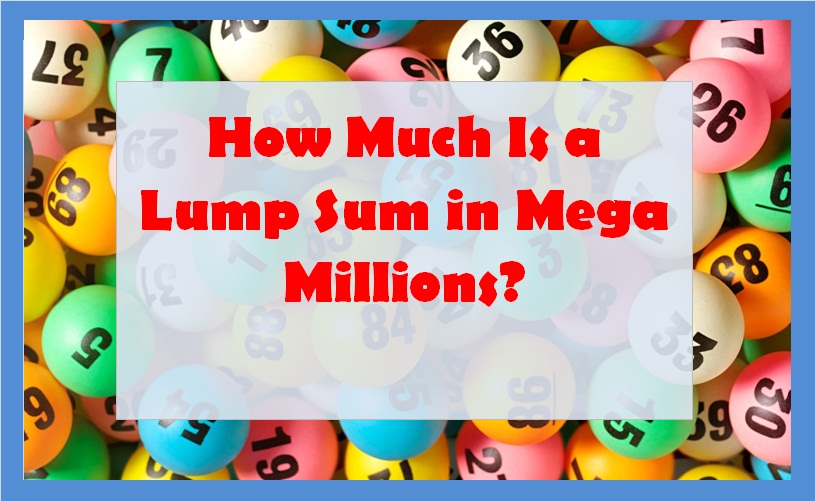How Much Is a Lump Sum in Mega Millions?
The Mega Millions lottery has captured the imagination of countless individuals with its promise of life-changing jackpots. When players hit the jackpot, they’re often faced with a crucial decision: Should they opt for the annuity or the lump sum? In this article, we’ll delve into the details of the lump sum option in the Mega Millions lottery, exploring its benefits, calculations, and factors to consider.
Understanding the Lump Sum Option
The Significance of the Lump Sum
Choosing the lump sum option means taking your jackpot winnings in a single, upfront payment. This option has gained popularity due to its immediate financial impact and potential for investment opportunities. But just how much is the lump sum in Mega Millions?
Calculation of the Lump Sum
The lump sum amount in Mega Millions isn’t simply the advertised jackpot amount. Lottery officials determine the lump sum through complex calculations that take into account the present value of the annuity, current interest rates, and expected returns on investments. As a result, the lump sum is typically less than the advertised jackpot but still substantial.
Factors Influencing the Lump Sum
Current Jackpot Size
The larger the jackpot, the larger the lump sum amount. However, it’s important to note that the lump sum is calculated based on the current size of the jackpot, not the annuity value.
Interest Rates and Investment Yields
Fluctuations in interest rates and potential investment yields can significantly impact the lump sum. In times of low interest rates, the lump sum may be higher, reflecting the opportunity cost of waiting for annuity payments over the years.
Tax Implications
Lottery winnings are subject to federal and state taxes. The lump sum amount is typically pre-tax, meaning that winners must set aside a portion of the lump sum for tax payments.
Financial Goals and Investment Strategies
Individual financial goals and investment strategies play a crucial role in determining whether the lump sum option is the right choice. Winners who are adept at managing investments might find the lump sum option more appealing.
Pros and Cons of the Lump Sum Option
Pros
- Immediate Financial Impact: The lump sum provides an immediate infusion of funds, which can be especially beneficial for pressing financial needs.
- Investment Opportunities: Winners can potentially invest the lump sum to grow their wealth over time.
- Control over Finances: Some winners prefer the lump sum for greater control over their financial future.
Cons
- Lower Total Payout: The lump sum is generally lower than the advertised jackpot due to calculations and taxes.
- Investment Risks: Managing investments carries inherent risks, and poor investment decisions could impact long-term financial security.
- Temptation to Spend: Without careful planning, winners might be tempted to overspend or make impulsive financial decisions.
Making an Informed Decision
Consulting Financial Professionals
Given the complexity of financial matters, it’s wise for Mega Millions winners to consult financial advisors, tax professionals, and legal experts. These professionals can provide personalized guidance based on individual circumstances.
Assessing Personal Priorities
When deciding between the lump sum and annuity options, winners should consider their short-term and long-term financial goals. A comprehensive understanding of personal priorities is crucial in making the best choice.
In conclusion, the decision between the lump sum and annuity options in the Mega Millions lottery is a complex one. Understanding the factors that influence the lump sum, seeking professional advice, and aligning your choice with your financial goals are key to making a well-informed decision that suits your individual circumstances.
Summary Table
| Aspect | Lump Sum Option |
|---|---|
| Calculation Method | Present Value, Interest Rates, Investments |
| Tax Implications | Pre-Tax Amount, Taxes Apply |
| Pros | Immediate Impact, Investment Opportunities, Financial Control |
| Cons | Lower Payout, Investment Risks, Temptation to Spend |
| Decision Factors | Jackpot Size, Interest Rates, Taxes, Financial Goals |
| Professional Guidance | Financial Advisors, Tax Professionals, Legal Experts |
FAQs: How Much Is a Lump Sum in Mega Millions?
1. Is the lump sum amount in Mega Millions the same as the advertised jackpot? No, the lump sum is generally lower than the advertised jackpot due to factors such as calculations and taxes.
2. Can I receive the lump sum option after taxes are deducted? No, the lump sum is typically provided pre-tax. Winners are responsible for setting aside funds to cover tax payments.
3. How are interest rates and investment yields factored into the lump sum calculation? Fluctuations in interest rates and potential investment yields influence the lump sum amount, particularly in times of low interest rates.
4. What are the benefits of choosing the lump sum option? The lump sum offers immediate financial impact, potential investment opportunities, and greater control over finances.
5. What are the drawbacks of selecting the lump sum option? The lump sum comes with a lower total payout, investment risks, and the potential temptation to overspend.
6. Can I consult professionals before making my decision? Absolutely, it’s advisable to seek guidance from financial advisors, tax professionals, and legal experts to make an informed choice.
7. Are there any circumstances where the annuity option might be preferable? Winners with a strong aversion to investment risks or those seeking a consistent income stream might find the annuity option more appealing.
8. How can I ensure that I make the right choice for my financial future? Assess your personal priorities, consult professionals, and carefully consider your short-term and long-term financial goals.
9. Can I change my decision after choosing the lump sum option? Once you’ve made your decision and claimed your prize, it’s typically not possible to change your option.
10. Are lump sum winnings treated differently for tax purposes? Lump sum winnings are subject to the same federal and state tax regulations as annuity payments, but winners may need to make estimated tax payments.

